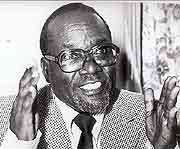Masinde Muliro
Masinde Muliro (June 30, 1922[1] – August 14, 1992) was a Kenyan politician, one of the central figures in the shaping of the political landscape in Kenya. A renowned anti-colonial activist, he campaigned for the restoration of multi-party democracy in Kenya in his later years. He was a ruthless negotiator and a proponent of peaceful but focused politics. He had a reputation for integrity rivaled only by Ronald Ngala. Considered by some as one of the best leaders that never became president, it has been speculated that had he not died, he may have beaten Daniel arap Moi for the presidency in 1992.

Early life
Henry Pius Masinde Muliro was born in Kimilili area of Kenya, the son of Muliro Kisingilie and his wife Makinia. His parents died when he was young, and he was brought up by an older stepbrother, Aibu Naburuku. After elementary and high school studies in Kenya and Uganda, he joined the University of Cape Town in South Africa in 1949. He enrolled for a Bachelor of Arts degree in English, History and Political Philosophy, and graduated in 1953 with degrees in Arts and Education. In 1954 he returned home with a South African wife, and taught for a while at a government school. In 1957, he quit his job to join politics.
Politics
In 1948, Muliro had joined the Kenya African Union (KAU), a body formed to champion the interests of Africans in colonial Kenya. When he quit teaching in 1957, he contested the Nyanza North Legislative Council seat which was then held by W.W.W. Awori (Elder brother of the former Kenyan vice president Moody Awori). Muliro won the election. Among his fellow legislators were Daniel arap Moi representing the Rift valley, Tom Mboya representing Nairobi area, Bernard Mate representing Central Province, Ronald Ngala representing Coast Province, James Nzau Muimi representing Eastern Province, Lawrence Oguda representing Nyanza South, and Oginga Odinga representing Nyanza Central. In 1958 Muliro formed the Kenya National Party with the support of 9 Legco members. He later on dissolved his party to join the Kenya African Democratic Union (KADU). He was subsequently appointed minister of commerce just before Kenya gained independence in 1963. Muliro worked in various positions in later governments, but was frequently on the wrong side of President Jomo Kenyatta. After Kenyatta's death, Muliro went back to Parliament after winning a petition in court. He served as the Kitale East Constituency until 1988, when the constituency was split up and contested the newly created Cherangany Constituency parliamentary seat in 1988, but lost to John Rotich who held the position only for two years. At the 1990 by-elections, the Cherangany seat was won by Kipruto Rono Arap Kirwa.[2]
Multi-Party Campaign
In 1989, Muliro teamed up with Kenneth Matiba, Charles Rubia, Martin Shikuku, Phillip Gachoka and Oginga Odinga to form FORD (Forum for restoration of democracy), a pressure-group agitating for a return to pluralist politics. After violent clashes pitting FORD supporters against police and government supporters, the KANU government accepted multi-partysm in 1991. FORD became a party with Muliro as its vice chairman.
Disagreements soon cropped up with two main rivals Oginga Odinga and Kenneth Matiba each wanting to run for presidency and not wanting to listen to reason. It was Shortly after this that Muliro left for London for a fundraising mission for the newly formed Ford political party. It was to be an ill-fated trip: on his return, upon his arrival at the Nairobi airport on the morning of August 14, 1992 he collapsed and died. The controversy of his death was heightened by the absence of an official post mortem. Muliro was buried on his farm in the Kitale area of Kenya.
The party, then split into two factions after Muliro died due to a disagreement on who was to run for the presidency against President Moi. Kenneth Matiba and Martin Shikuku claiming that they are the real owners of Ford splitting to form Ford Asili and Odinga and others forming Ford Kenya. Had Masinde Muliro not died, the original FORD would have remained united and possibly would have removed president Moi in 1992.
References
- Simiyu Wandiiba. Masinde Muliro: A Biography (Nairobi: EAEP, 1996)